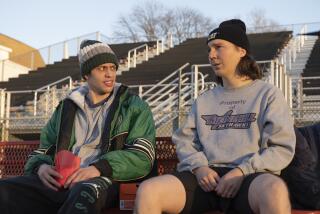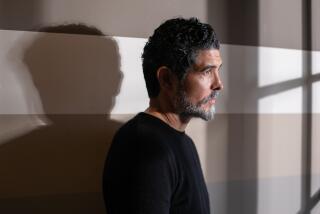Trading Places
- Share via
PINEWOOD STUDIOS, England — Nick Leeson, one feels, would relish the scene.
It’s a busy trading floor, strewn with a thousand discarded trading slips. In the pit, surrounded by banks of computer screens, crowds of young Asian dealers in garish striped jackets make hurried notes, wave and scream: “Sells nine-fifty bid for 500! Sell!” The noise deafens.
High around the room, stock figures fluctuate on TV monitors. A big board shows the Nikkei index--18,370 and rising. The din intensifies.
It was in such an setting that Leeson flourished. “King of the Exchange,” they called him when he strutted around Simex, Singapore’s international monetary exchange, wheeling, dealing and making a fortune for his employers, the London-based merchant bank Barings.
Yet this isn’t Simex, but an impressive replica, built for a film. The boisterous young traders are extras who live in Britain. Cameras roll as they shout and gesticulate at director James Dearden’s repeated behest.
Englishman Dearden, who wrote the mega-hit “Fatal Attraction,” is now filming his latest script, “Rogue Trader”--an account of Leeson’s fraudulent role in bringing down Barings, which collapsed with losses of $800 million in 1995. It is based on Leeson’s autobiography of the same name.
Leeson cannot be here to see this part of his life filmed; he is in Changi jail in Singapore for his part in Barings’ collapse, serving what remains of a 6 1/2-year sentence. Even with time deducted for good behavior, he will remain there for at least 18 months.
It may be small consolation to Leeson, but at least he is being portrayed by Britain’s arguably most charismatic young actor, Ewan McGregor, who strolls out of Simex in a later scene, anonymous in the bustle of traders. To play Leeson, McGregor’s hair has unflatteringly been brushed forward; he, too, wears a striped jacket--in lurid blue and yellow.
But what are the ethical considerations surrounding a film told from the viewpoint of a man who is, after all, a criminal? And does Leeson profit from the venture?
These are questions for the film’s executive producer, who turns out to be Sir David Frost, the TV presenter and interviewer. Frost had interviewed Leeson for a BBC special in 1995 in Frankfurt, where Leeson was apprehended after fleeing from Singapore. (The interview was shown in the U.S. on “60 Minutes.”)
“It was clear that this was a wonderful story,” said Frost. “So I resolved to get hold of the film rights.”
Which included paying Leeson? “Nick gets a rights fee for the rights to his life, yes. All of which will be consumed by the fees for his defense.”
Frost would not discuss details of payments to Leeson: “All I can say is, this film is tightly budgeted. I’d say it’s a fair fee.” Does he have qualms about paying a convicted criminal? “Everyone has a right to their life. This is not a violent or sexual crime. It’s not burglary. It’s not brutal. It’s white-collar crime.”
Nor, it appears, are there legal problems in compensating Leeson: “I know we’re in the clear, though I can’t give you chapter and verse as to why,” Frost added. “But [lawyers] had it checked out.
“I came to the conclusion shared by everyone in our crew who met Nick--he absolutely doesn’t have a hoard of money stashed away. His lawyers would be furious and disillusioned if that were the case--he could only afford to pay part of their fees.”
Not that everyone is happy “Rogue Trader” is being filmed; Frost has received pointed calls about it from influential London financiers. “They’d say, ‘David, I don’t think it would help anybody if you do a film about Nick Leeson. I don’t think it would help you.’ ” All of which made Frost more certain he had a good story, and more determined to get the film made.
Those callers may be even less happy on seeing the film; Dearden’s script, even more than Leeson’s book, stresses the story’s class elements. Leeson was a young man with a blue-collar background from Watford, a dolorous, unlovely town 20 miles north of London. Hard-working and ambitious, he rose swiftly at Barings, the world’s oldest merchant bank, which was founded in 1763; it financed the Louisiana Purchase in 1803. Its boardroom was filled with suave, genteel, upper-class Englishmen quite unlike Leeson. Yet in his capacity as the bank’s Singapore general manager he profitably moved around millions of pounds on its behalf.
But he also manipulated balances to make his trading appear profitable when it was actually sustaining huge losses; his superiors in London gave him free rein, apparently unaware that his activities were jeopardizing Barings’ very existence.
These executives emerge from Dearden’s script in an unflattering light. And in interviews subsequent to his arrest, Leeson has complained that Barings sought to make him the sole scapegoat for the collapse.
“They hung him out to dry,” said Frost. “I have no doubt that if his name was [the more upper-class-sounding] Nick Fotheringay-Leeson, he wouldn’t be serving time now.”
But does the film of “Rogue Trader” glamorize Leeson? “Well, yeah,” said McGregor. “Though,” he added hastily, “I don’t think because I’m in it, it’s necessarily glamorous. But this film is based on his book, which is bound to glamorize him. You could choose not to make a film based on his book, but that would be a different kind of film.”
Of the people on the set, only Dearden has seen Leeson in jail in Singapore. “He looked unhappy, lonely and isolated,” said Dearden. “He was behind a plate-glass screen, we talked over an inadequate microphone, and 20 people were screaming at the tops of their voices in Chinese and Malay on either side. He was extremely paranoid because he assumed the guards would be listening to our conversation.”
Dearden and Frost agreed to develop a spec script without securing funds first: “I knew it was the kind of subject matter people who make decisions about movies would not like. It’s about finance, a loser, and in some people’s eyes a bad person.
“But I don’t think he’s a particularly bad person, he’s Everyman. We are all Nick Leeson. We want to succeed and we fear being discovered as not as good as we present ourselves. We all secretly have doubts about our ability, so I can understand someone over his head digging himself into a deeper hole.”
The film now looks salable, due to the presence of McGregor and of Anna Friel, a popular young actress from the British TV soap opera “Brookside,” who has dyed her dark hair blond to play Leeson’s wife, Lisa. (She left Singapore with Leeson, but was not implicated in the scandal, and since returning to Britain has worked as a flight attendant for Virgin Airlines.) McGregor, who is Scottish, and Friel, from Lancashire in the north of England, have modulated their voices to speak in the Leesons’ London-area accents.
Granada Films, an arm of one of Britain’s leading TV companies, has largely financed “Rogue Trader” along with Frost’s Paradine Productions, so it is likely to play heavily on British TV in coming years. An American production deal has not yet been secured.
After five weeks’ shooting at Pinewood, the production set off early in the new year for mainly exterior scenes in Malaysia, Indonesia and Singapore. “The Malaysian currency has been suffering, which helps us,” noted producer Paul Raphael. And, more recently, currency markets in the entire “tiger economy” region have been badly hit.
McGregor may have undertaken better-paid roles in the last 12 months (notably the lead in the next “Star Wars” film) but none he has enjoyed more. “I feel it’s the most acting I’ve done this year,” he mused. “There’s a lot to bite my teeth into.”
He read Leeson’s book, watched the Frost interview, and had long talks about Leeson with two of his former colleagues from Simex. One of them, Danny Argyopoulos, traded Japanese government bonds on the floor of Simex close to Leeson, with whom he frequently socialized.
“Nick was a lovely bloke, a really nice guy,” said Argyopoulos, an energetic young man with a brash manner. “I think it’s unfair the way he got treated. Barings gave him more than enough rope to hang himself.
“But I think Nick got carried away with the importance Barings bestowed on him. They were like, you’re the king of the exchange. And he started to believe his own press cuttings.
“I don’t know how fair the story is in the film. A lot of it is Nick telling his side of things. There’s poetic license. If he was having troubles, he pretty much hid them from everyone. But that’s not so unusual. You can end a day losing $20,000, but if you’ve expected to lose $150,000, it’s a good day and you can be out buying drinks afterwards.”
It’s a pressurized life, then, being a trader, and one that would never tempt McGregor: “I couldn’t hack it for five minutes.” And he is happy to play Leeson without talking to him first: “I’d have been embarrassed. What would I say? ‘Hi, I’m playing you in a movie and you’re rotting in jail.’ It would be awful.”
Yet he hopes to meet Leeson when his jail sentence is over and the film opens: “This was a guy with an intriguing dilemma. He started making these massive losses, but what choice did he have but to carry on? The more I learn about him, the more he comes to fascinate me.”
More to Read
Inside the business of entertainment
The Wide Shot brings you news, analysis and insights on everything from streaming wars to production — and what it all means for the future.
You may occasionally receive promotional content from the Los Angeles Times.










